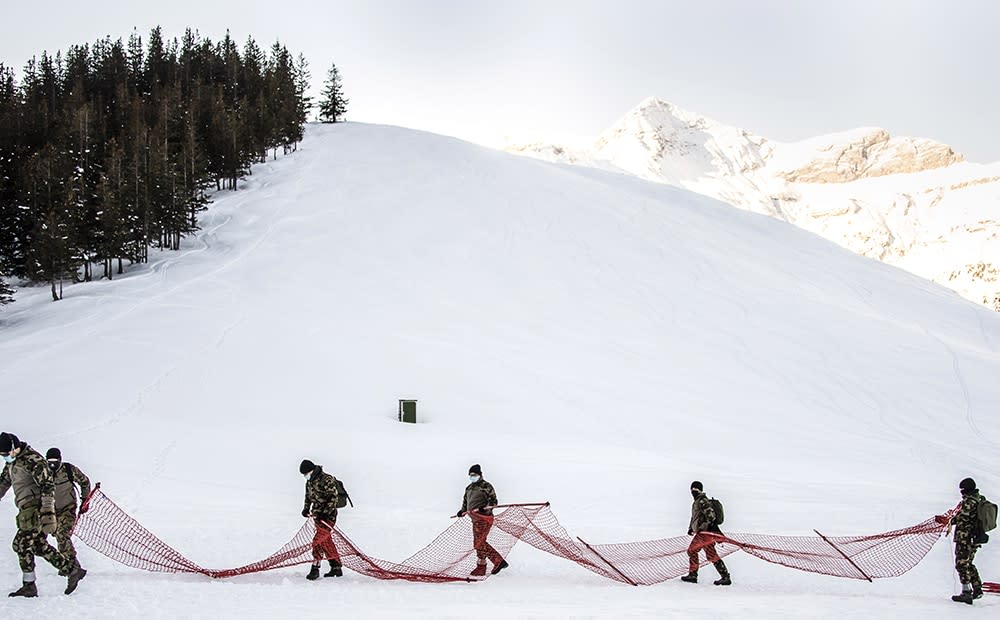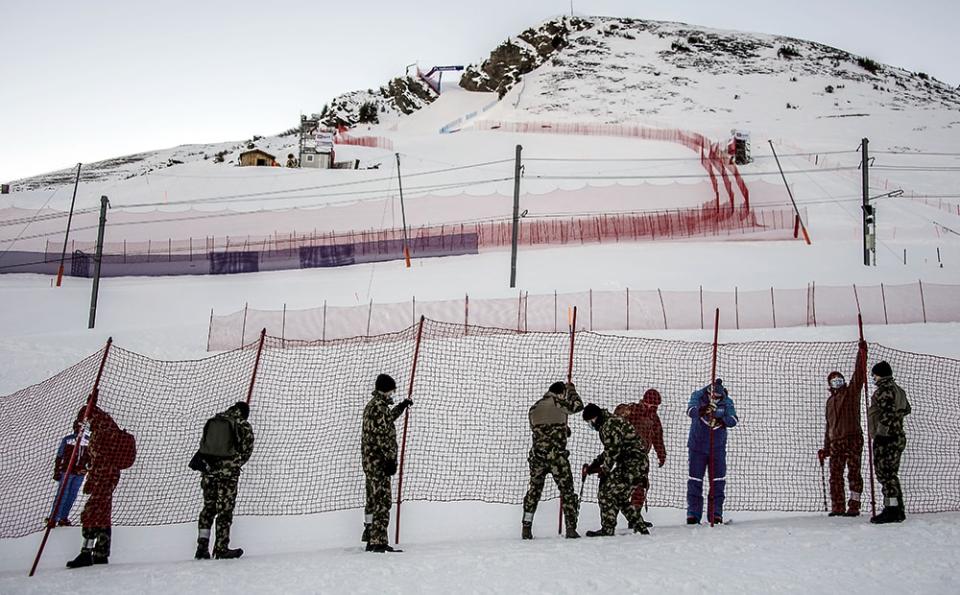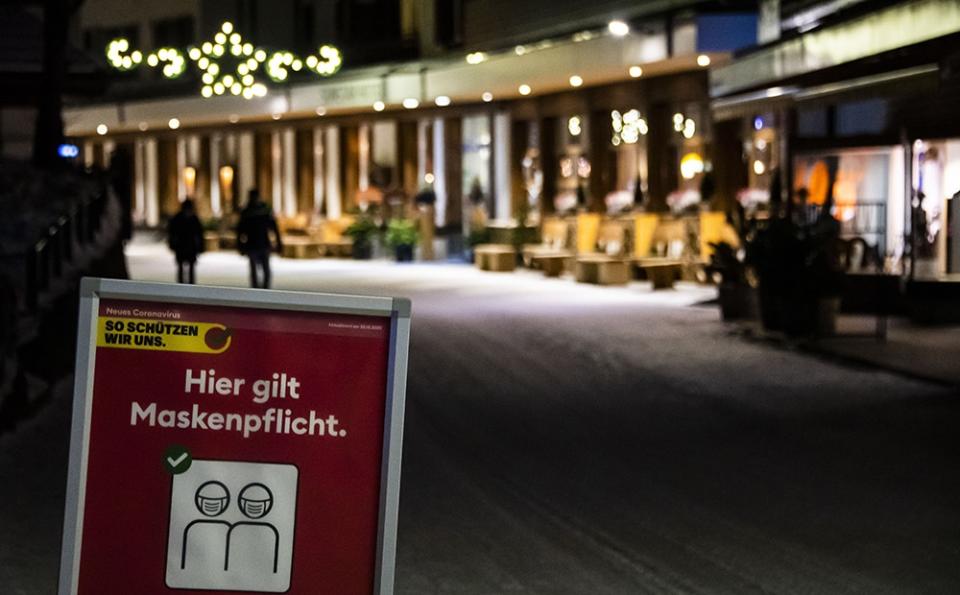‘We do not blame the British’ – Swiss locals react as Covid outbreak cancels annual ski race

Watching safety netting being pulled from a ski race course, which was so immaculately prepared by the Swiss army and local volunteers only 24 hours previously, is a depressing sight. Ahead of the busiest and most popular weekend of the ski season in the Swiss mountain resort of Wengen, the resort has been left looking more like a ghost town as the result of a cluster of Covid-19 cases to have reached the car-free village.
The cases were detected thanks to the foresight of the Lauberhorn Race Committee along with the local doctor, who took the decision on December 12 to erect a “rapid” Covid testing facility in the village centre on January 4, specifically in preparation for the World Cup downhill race, due to take place this coming weekend.
From the white tent testing facility in the centre of the village, results were produced in 15 minutes for all hoteliers and racers prior to the race weekend and, much to the dismay of organisers and locals alike, a number of these returned positive, some of which also showed the new Covid variant, B117.
According to the Canton Bern website on January 11 there were 60 cases in Wengen confirmed over a four week period. Consequently the authorities have had no other choice but to cancel the races. It's devastating for those of us who look forward to this weekend the entire winter and the businesses that rely on its popularity.
Unlike some other race circuit resorts who have pressed on with scheduled competitions, Wengen thought it responsible to take such decisive action, despite it meaning the cancellation of their biggest event of the year.

What’s more, in a further precautionary act, the decision was made to test the entire population of the village, offering the “rapid” test free to all and instructing those testing positive to remain at home and self isolate.
There have been reports emanating from Switzerland that this Covid-19 outbreak in Wengen is out of control, with some likening it to the Ischgl cluster, known as the “Ibiza of the Alps,” back in February 2020. This couldn’t be further from the truth.
While the ski lifts have been open, restaurants and bars in Wengen have been closed to inside dining since December 22 and, as from December 12, the law has stated that all establishments needed to be shut by 7pm. Hotels have been open but made to observe a strict guest-only policy and Britons, like myself, who arrived after December 14 were forced into quarantine. Scenes here in Switzerland couldn’t be more different from those in Ischgl last season.
Needless to say, the mood in Wengen is at a low ebb. Locals feel deflated and disappointed and, as often can happen in a small town, are looking to place the blame somewhere, with much finger pointing.
In reality, no one knows where, how or who initially brought in the virus. It seems, from reading numerous reports, that the British are bearing the brunt of the blame – again.

This could be because of the reported bad behavior in Swiss resorts over Christmas, but there had also been many Swiss, Dutch, Belgian and German visitors in the resort, none of whom were expected to have tests before entering the village, for their Christmas and New Year’s holidays. Ski Schools were full and hotels filled up quickly.
Wengen was one of the only resorts open in Europe over the festive period and so, inevitably, visitors flocked into this Swiss Alpine village. The virus could have come from anywhere.
Wherever it came from the pandemic continues to have a lasting impact on businesses here in Wengen. Many of the hoteliers have seen the cancellation of the Lauberhorn as a sign to shut their doors for the entire winter season.
Bettina Zinnert along with the Cova family, who are Wengen hoteliers and prominent families of the community, were happy to share their feelings regarding the latest new: “We do not blame the British for the cancellation of the World Cup downhill. The new B117 variant was found recently in Gstaad, Zermatt and many other ski resorts. We hope this does not impact the decision for the Brits returning to Wengen in the future, as we would welcome them with open arms.”
It would seem now that the Lauberhorn Race Committee has set the standard for Alpine races going forward too. The Kitzbühel slalom has been cancelled because of growing numbers of Covid cases in a small village near the resort, including the new B117 variant. The race has been moved to the resort of Flachauof, for this weekend, and officials will test the entire region of Kitzbühel ahead of the major downhill race, arguably one of the most famous events on the race calendar, set for the following weekend.
Standing outside the test centre yesterday, alongside the Swiss army, waiting for my results with my family felt a bit like an exam results day, but we all tested negative, with great relief.

A few locals have tested positive with the new variant of Covid-19, having reported flu-like symptoms, such as loss of taste and lethargy, but on the whole these patients are in good spirits and holding up in their own homes – I’ve learnt first hand there are few better place to be in isolation than in the Swiss Alps.
Although Wengen currently remains shrouded in a Covid-19 cloud, the resort should be proud that it took the correct precautions and exercised responsibility, however disastrous the outcome.
It seems the weather also took the news badly, as the region has been hit with severe storm warnings – how fitting. Nevertheless, when the winds die down and the heavy snow ceases to fall, there will be a silver lining in the form of deep powder snow for the locals to enjoy, safely.


